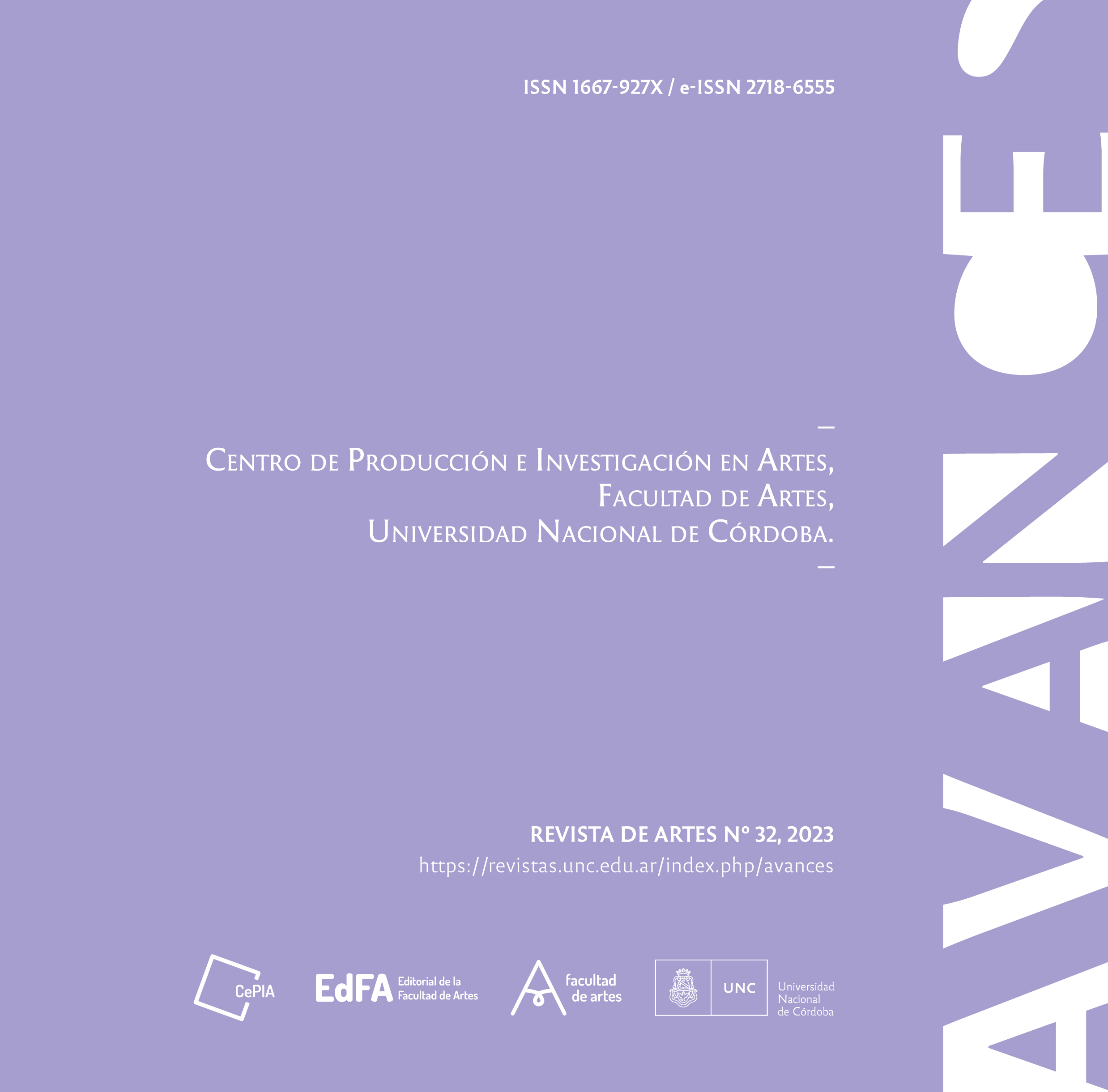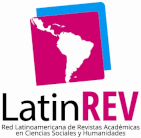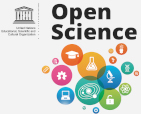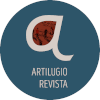El tema de la cabeza antropomorfa en la producción plástica nasca y moche
Keywords:
Iconography, Cross and interdisciplinary fields, Agency, Ontology, Trophies of warAbstract
The practices of decapitation and post mortem treatment of the head of the sacrificed are abundantly documented in the Andean
archaeology, especially on the southern Peruvian coast. Apart from the archaeological findings, there is a frequent presence of the
motif that has been identified as “trophy head” in various objects. In this work we will concentrate on the analysis of a corpus of
Nasca and Moche modeled and polychrome ceramic that belongs to the Ethnographic Museum “Juan B. Ambrosetti” (Facultad de
Filosofía y Letras, Universidad de Buenos Aires) and the “Larco” Museum (Lima, Perú). Through the archaeological information
and the iconographic analysis, we will investigate the role that the images of anthropomorphic heads played as active agents in the
configuration of cosmologies and cosmogonies in relation to social behaviors connected to death, sacrifice, fertility and the renewal of the life cycle.
Downloads
References
Alva, W. y Donnan, C. (1993). Tumbas reales de Sipán. Fowler Museum of Cultural History, UCLA.
Bachir Bacha, A. y Llanos Jacinto, O. (2006). El Gran Templo del Centro Ceremonial de Cahuachi (Nazca, Perú). Dimensión Antropológica, 13(38), pp. 49-86.
Benson, E. (2001) Why Sacrifice?. En E. P. Benson y A. G. Cook (Eds.), Ritual sacrifice in ancient Peru (pp. 1-20). University of Texas Press.
Benson, E. (2012). The Worlds of the Moche on the North Coast of Peru. University of Texas Press.
Browne, D. et al. (1993). Report. A cache of 48 nasca trophy heads from Cerro Carapo, Perú. Latin American Antiquity, 4(3), pp. 274-294.
Bourget, S. (2001). Rituals of Sacrifice: Its Practice at Huaca de la Luna and Its representation in Moche Iconography. En J. Pillsbury (Ed.), Moche Art and Archaeology in Ancient Perú (pp. 89-106). National Gallery of Art.
Bourget, S. (2004). But Is It Art? The Complex Roles of Images in Moche Culture, an Ancient Andean Society of the Peruvian North Coast. En M. Westermann (Ed.). Anthropologies of Art (pp. 164-177). Sterling and Francine Clark Art Institute.
Bovisio, M. A. (2008). De Imágenes y Misterios: El problema de la interpretación del “arte” prehispánico [Tesis doctoral, Universidad de Buenos Aires, Facultad de Filosofía y Letras. No publicada]. Buenos Aires, Argentina.
Bovisio, M. A. (2011, mayo). Interpretar imágenes prehispánicas: lo “real” en el arte. Boletín de Estética. Publicación del Programa de Estudios en Filosofía del Arte del Centro de Investigaciones Filosóficas, UNSAM, 3(18), pp. 19-45.
Carmichael, P. (1988). Nasca mortuary customs: death and ancient society on the south coast of Peru [Tesis doctoral, University of Calgary. No publicada]. Calgary, Canadá.
Cordy-Collins, A. (1992). Archaism or Tradition? The Decapitation Theme in Cupisnique and Moche Iconography. Latin American Antiquity, 3(3), pp. 206-220.
Cordy-Collins, A. (2001). Decapitation in Cupisnique and Early Moche Societies. En E. P. Benson y A. G. Cook (Eds.), Ritual sacrifice in ancient Peru (pp. 21-34). University of Texas Press.
Cornejo, L. et al. (1996). Nasca. Vida y muerte en el desierto. Museo Chileno de Arte Precolombino.
Descola, P. (2011). Más allá de la naturaleza y de la cultura. En L. Montenegro (Ed.). Cultura y Naturaleza: Aproximaciones a propósito del bicentenario de la independencia de Colombia (pp. 75-96). Jardín Botánico de Bogotá Celestino Mutis.
Donnan, C. (1978). Moche art of Peru: Pre-Columbian symbolic communication. Fowler Museum of Cultural History.
Donnan, C. (2004). Moche Portraits from Ancient Peru. University of Texas Press.
Francastel, P. (1988). La realidad figurativa I. El marco imaginario de la expresión figurativa. Paidós.
Forgey, K. y Williams, S. (2003). Cabezas trofeo nasca: evidencias osteológicas y arqueológicas de la colección Kroeber. Revista andina, 36, pp. 237-262.
Gell, A. (1998). Art and Agency. An Anthropological Theory. Clarendon Press.
Kubler, G. (1988). La configuración del tiempo. Nerea.
Larco Hoyle, R. (2001[1938]). Los mochicas (Vol. 1). Museo Arqueológico Rafael Larco Herrera, Fundación Telefónica.
Proulx, D. (2006). A sourcebook of Nasca ceramic iconography. Reading a culture through its art. University of Iowa Press.
Quilter, J. (2007). Representational Art in Ancient Peru. En R. Osborne y J. Tanner (Eds.). Art’s agency and art history and the Work of Alfred Gell (pp.135-157). Blackwell Pub.
Tello, J. (1918). El uso de cabezas humanas artificialmente momificadas y su representación en el antiguo arte peruano. Revista Universitaria, 13(1), pp. 478-533.
Tello, R. (1998). Los conjuntos arquitectónicos 8, 17, 18 y 19 del Centro Urbano Moche. En S. Uceda, E. Mujica y R. Morales (Eds.), Proyecto Arqueológico Huacas del Sol y de la Luna. Investigaciones en la Huaca de la Luna 1996 (pp. 117-135). Facultad de Ciencias Sociales-
Lima y Universidad Nacional de la Libertad-Trujillo.
Tung, T. (2008). From corporeality to sanctity: transforming bodies into trophy heads in the Prehispanic Andes. En R. Chacon y D. Dye (Eds.), The taking and displaying of human trophies by Amerindians (pp. 477-500). Springler Press.
Ulhe, M. (1914). The nazca pottery of ancient Perú. En Proceedings of the Department Academy of Sciences, 13 (pp. 1-46). Davenport Academy of Science.
Verano, J. (1995). Where do they rest? The treatment of human offerings and trophies in Ancient Peru. En T. Dillehay (Ed.), Tombs for the Living: Andean Mortuary Practices (pp. 189-227). Dumbarton Oaks.
Verano, J. (1998). Sacrificios humanos, desmembramientos y modificaciones culturales en restos osteológicos: evidencias de las temporadas de investigación 1995-1996 en la Huaca de la Luna. En S. Uceda et al. (Eds.), Proyecto Arqueológico Huacas del Sol y de la Luna. Investigaciones en la Huaca de la Luna 1996 (pp. 159-171). Facultad de Ciencias Sociales-Lima y Universidad Nacional de la Libertad-Trujillo.
Verano, J. (2001a). War and Death in the Moche World: Osteological Evidence and Visual Discourse. En J. Pillsbury (Ed.), Moche Art and Archaeology in Ancient Peru (pp. 111-125). Washington D.C.: National Gallery of Art.
Verano, J. (2001b). The physical evidence of human sacrifice in ancient Peru. En E. Benson y A. Cook (Eds.), Ritual sacrifice in ancient Peru (pp. 165-184). University of Texas Press.
Verano, J. (2003). Mummified Trophy Heads from Peru: Diagnostic Features and Medicolegal Significance. Journal of forensic sciences, 48 (3), pp. 525-530.
Verano, J. (2008). Trophy head-taking and human sacrifice in Andean South America. En H. Silverman y W. Isbell (Eds.), Handbook of South American Archaeology (pp. 1054-1058). Springer.
Verano, J. et al., (1999). Modified human skulls from the urban sector of the pyramids of Moche, Northern Peru. Latin American Antiquity, 10(1), pp. 59-70.
Downloads
Published
Issue
Section
License
Copyright (c) 2023 María Paula Costas, Estefanía Blasco-Dragun

This work is licensed under a Creative Commons Attribution-NonCommercial-ShareAlike 4.0 International License.





















